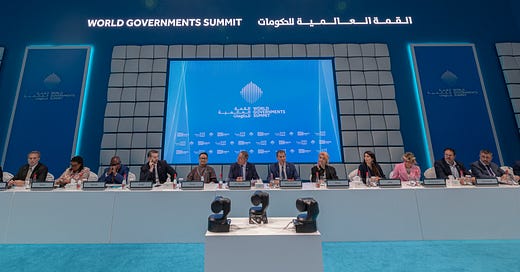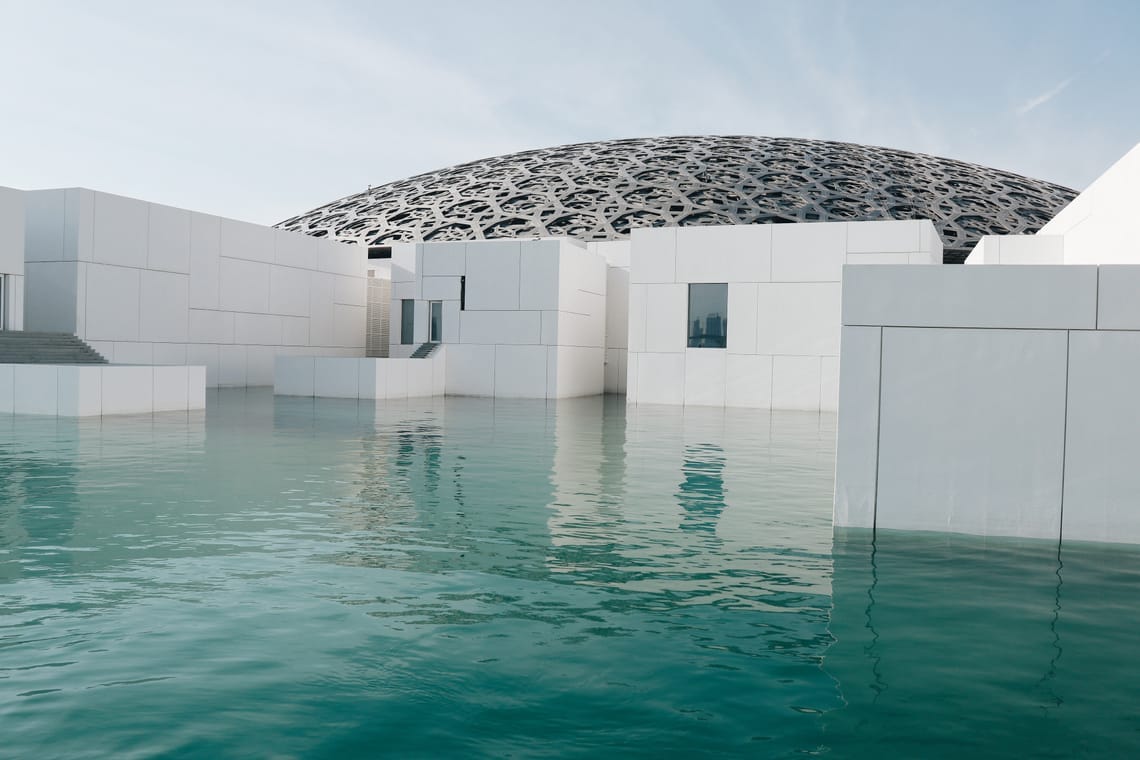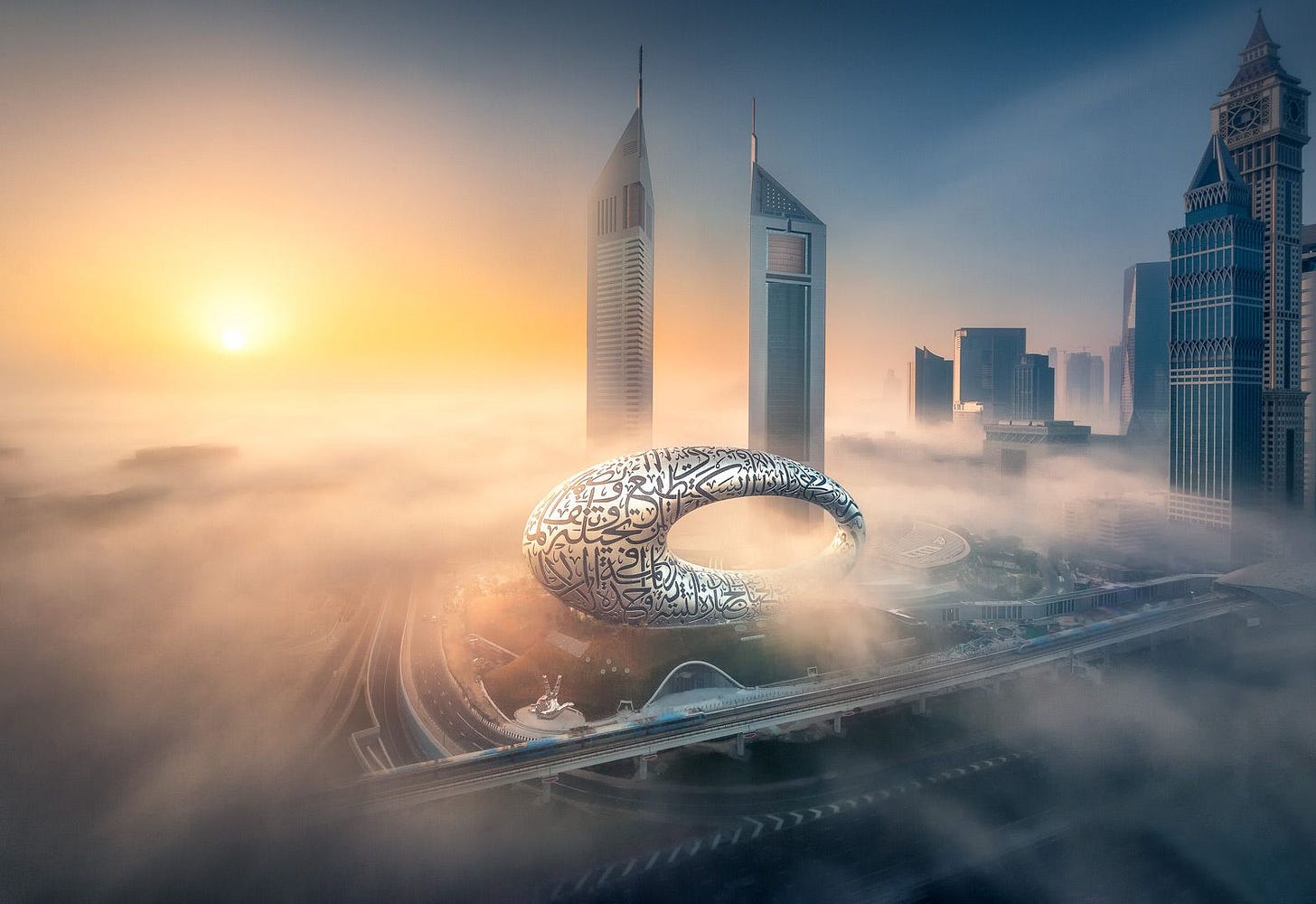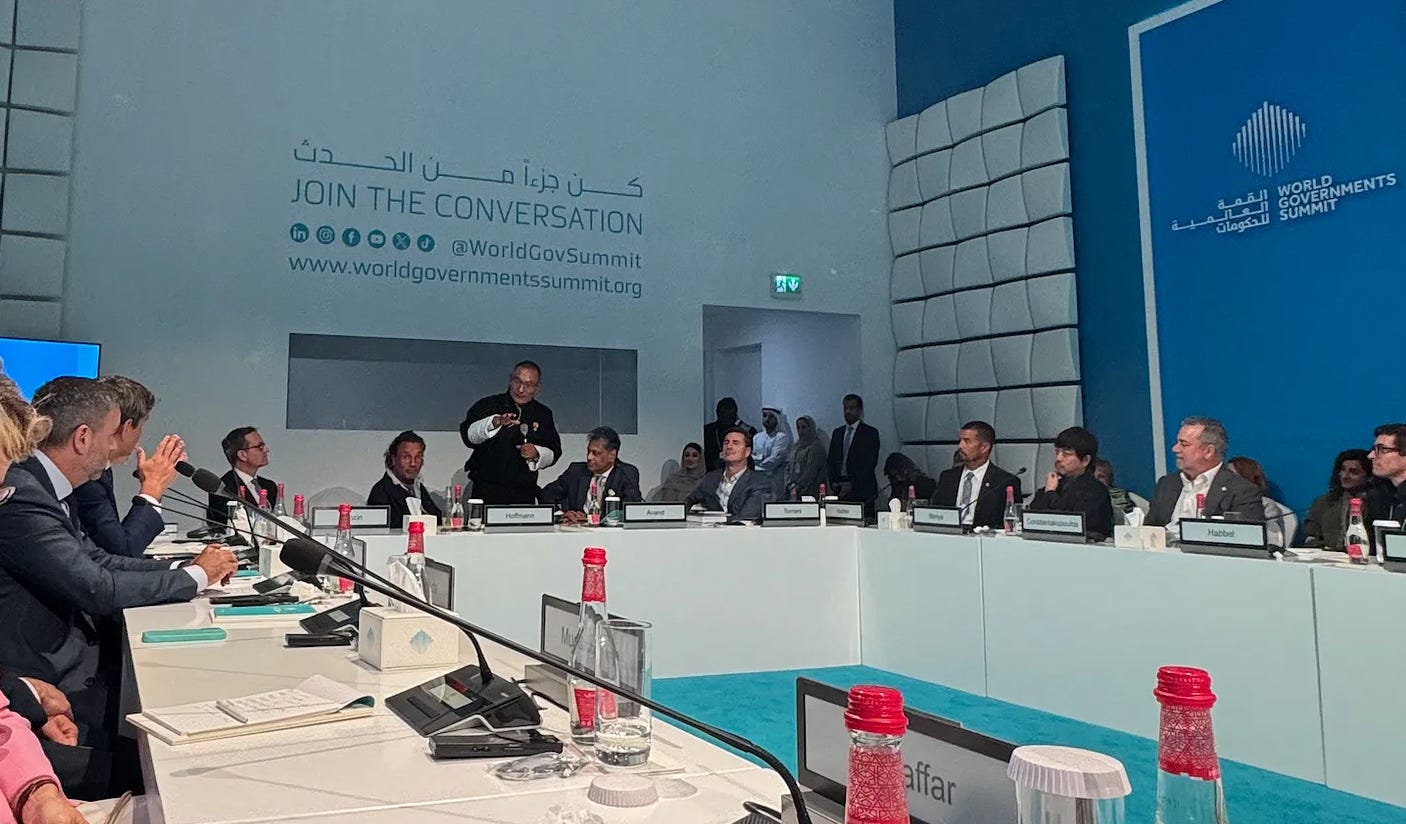5 Things I Learned at the World Governments Summit 2025 in Dubai
A report on the global conference held from February 11–13, 2025
From February 11–13, 2025, I was invited to attend The World Governments Summit (WGS) in Dubai. Now in its 12th edition, WGS is a global conference that brings together over 30 heads of state and government leaders, 400 ministers, more than 80 international organizations, over 140 government delegations, and more than 6,000 participants. The goal is to identify and strengthen solutions for economic stability, digital transformation, and meaningful change through public-private partnerships.
Past speakers at WGS have included global leaders such as Bill Gates, Elon Musk, Sheikh Mohammed bin Rashid Al Maktoum (Vice President and Prime Minister of the UAE), and António Guterres (Secretary-General of the United Nations).
It was an incredible experience to attend and speak at such a prestigious event.
This was my first time in the Middle East, my first time in Dubai. Excited and full of anticipation, I set off from Japan, stepping into an unfamiliar land. This blog is my report as an Aww producer navigating the experience.
*Dubai Desert and Me. Photo: Peter Sayn
When Global Leaders Eat Together, the Future Changes
I arrived in Dubai a few days before the summit. The reason for my early arrival was to attend another…happening called "NOT A SUMMIT", a conference-like gathering held prior to the main summit. Unlike the World Government Summit (WGS), which hosts 6,000 attendees, this was an intimate event with only about 60 participants. Hosted by the Crown Prince of Dubai, the program was nothing short of extraordinary—dining with at the roayl palace, holding mini-conferences in the desert, and sipping mocktails aboard the fourth-largest private yacht in the world.
The exclusive sessions brought together an impressive lineup of individuals: Malaysian princes, son of the Porsche family, CEOs of major companies like HP and Roblox, founders of startups like NOTHING, and professors of economics and AI from the most prestigious universities.
Honestly, I was stunned by the sheer caliber of the attendees.
Bringing together such distinguished figures from around the world in the same room, sharing meals, engaging in deep conversations, and forming genuine human connections—it was a remarkable experience. More than anything, I deeply respected the way this space was so carefully curated, providing a setting where real discussions could take place. The commitment to "creating something new in Dubai" felt incredibly genuine.
*At WGS, Elon Musk and UAE’s Minister of AI & Digital Economy, Omar Sultan Al Olama, Took the Stage.
Tourism Becomes Innovative
At WGS (World Government Summit), amidst various speeches and roundtable discussions, I participated as a speaker in the "Future of Tourism Roundtable" panel. Unlike presentations with traditional panels with slides or a fireside chat, this session had around 40 participants seated around a roundtable, engaging in open discussions. It was my first time experiencing this format—where you had to raise your hand and speak up among a large group, reminiscent of a parliamentary debate—which made me quite nervous, to be honest!
The theme was tourism. Among the participants were industry leaders like Rainer Stampfer from Four Seasons, Satya Anand from Marriott International, Ghaith Al Ghaith from Flydubai, and Stan Shparberg from Airbus. Additionally, high-ranking government officials, including Prime Minister Dasho Tshering Tobgay of Bhutan, Prime Minister Roosevelt Skerrit of Dominica, and Prime Minister Jeremiah Manele of the Solomon Islands, were also present.
Together, we discussed the future of tourism - what are the challenges we face today? When I presented the current surge of tourists in Japan, everyone nodded in agreement. While Japan is fortunate to have a strong tourism industry, it also faces the unique challenge of a declining birthrate, making it an eager early adopter of digital solutions for tourism, including interactive virtual humans like those provided by Aww.
Topics such as personalizing travel experiences and workforce development in tourism were frequently discussed. I felt that services like virtual humans could eventually become mainstream in this field, shaping the future of tourism in new and innovative ways.
*I was the only one with …pink hair on the stage at the "Future of Tourism Roundtable."
There’s a Louvre in Abu Dhabi?!
Whenever I’m invited abroad, I make it a point to visit local museums and art galleries. To truly understand a place, I feel the need to immerse in its culture firsthand.
This time, I took a one-hour drive from Dubai to Abu Dhabi to visit the Louvre. Yes, the Louvre—one of the most famous museums in Paris—also exists in Abu Dhabi. (Louvre Abu Dhabi was named as part of a cultural partnership between the Louvre Museum in Paris and the government of Abu Dhabi.)
What surprised me even more about Abu Dhabi was that right next to the Louvre is the British Museum, and right next to that is a TeamLab exhibition under construction. The area still looked like a construction site, but the sheer ambition of bringing in global partnerships to replicate these iconic institutions in Abu Dhabi is mind-blowing. It’s crazy—but in an exciting way.
On top of that, this Louvre apparently AI to assist with curation. AI helps curators model exhibitions before they are physically created and offers personalized tours through an app.
I wonder what they’ll build next…
*The Louvre in Abu Dhabi. Yes, that Louvre.
This City is Straight Out of a Sci-fi movie
One of the most attention-grabbing projects presented at WGS2025 was the "Dubai Loop," announced by Elon Musk and Omar Sultan Al Olama. This project is a transportation system using electric vehicles, similar to the Las Vegas Loop, but on a much larger and faster scale. At 160 km/h, zero-emission electric vehicles will transport passengers. Additionally, AI-driven traffic optimization and the latest tunnel technologies will be combined.
As I listened to this presentation in the audience, I couldn’t help but feel goosebumps, realizing that the UAE is dead-serious on creating a futuristic city straight out of a sci-fi movie.
Similar to the ongoing construction of THE LINE and Kiddyia in Saudi Arabia, the Middle East, particularly Saudi Arabia and the UAE, is using the vast wealth gained from oil exports to invest in technology and sustainable industries, creating entirely new, future-focused cities. Furthermore, large government-led projects can progress rapidly, thanks to centralized control over land and resources, avoiding the bureaucratic delays often seen in Western countries. This is something I really felt during the event.
As I gazed out the car window at the vast number of towering buildings passing by, it truly felt like I had stepped into a sci-fi movie.
*Dubai looks and feels like a sci-fi movie
How to change the world? Story Telling.
I want to write about the most moving experience I had.
It was during the "Future of Tourism Roundtable," when Bhutan's Prime Minister, Dasho Tshering Tobgay, was handed the microphone for a brief 10 minutes. Until that moment, I knew nothing about Bhutan or the Prime Minister himself.
When he was given the microphone, the first thing he said was, "I could talk endlessly about Bhutan, but I'd rather speak in a way that answers what you all want to know. Are there any questions?"
One of the speakers asked, "When is the best time to visit Bhutan?"
To summarize his answer: "Bhutan is a beautiful place all year round." A very simple, ordinary answer. However, after he spoke, there was an eruption of ovation around the room. All the suited adults in the room—about 40 of them—were drawn into his words.
What he did was very simple.
He didn’t just answer - he told a story.
Like reading a poem, the Prime Minister shared with us the landscapes, people, climate, and regions of Bhutan, exactly as he had seen them. Instead of using complex words or boasting, he spoke of the colorful flower fields in Bhutan's mountains and the pleasant breeze one feels there. It reminded me of the feeling I had as a child when someone read me a picture book, as though a completely different world was unfolding before my eyes. I believe everyone in the room had the same feeling. The atmosphere instantly shifted, and it felt as though everyone had been transported to the doorsteps of Bhutan.
The moment he finished speaking, the adults—whose faces had been serious—broke into smiles, and a round of applause filled the room.
I was so moved that I got goosebumps. Because, in that moment, I realized that the Prime Minister of Bhutan had one job to do, in that room. It wasn’t about exchanging difficult ideas or pretending to understand something we didn't, or showing off his importance, or presenting information for discussion.
His job was simple: to make us fall in love with Bhutan.
In just 10 minutes, he made 40 adults—who do not think daily about Bhutan, or me, at all—genuinely want to visit the country. Representatives from major hotel groups, leaders in the aviation industry, other foreign prime ministers, and government officials all wanted to visit Bhutan.
There was no greater task than that. No matter how logical the arguments, if people don’t feel like going, the tourism industry doesn’t work.
Thanks to him, even after returning to Japan, I still think about Bhutan. What kind of country is it? What kind of people live there? I believe the only thing that can change someone who has never once thought about Bhutan is storytelling.
The people who can make big changes are always the ones who can move hearts.
On the other hand, if hearts are not moved, people will not change.
Every day, we receive tons of information through social media, news, and conferences. But the reason society doesn’t change is because we’re not moved. Humans haven’t evolved to act based on information and numbers alone. It’s when we hear someone’s story, learn about someone’s experience, watch a movie, or see an unbelievably beautiful scene that our hearts are moved and we begin to change.
The people who will become the leaders of the world are those who can move many hearts. This will never change as long as we remain human. And he reminded me of this.
It was at the Dubai Summit where I first truly felt, "I want to visit Bhutan."









